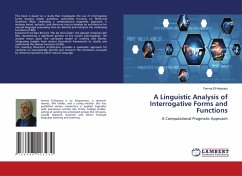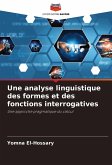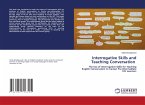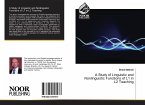This book is based on a study that investigates the use of interrogative forms beyond simple questions, specifically focusing on Rhetorical Questions (RQs). Employing a computational pragmatic approach, it analyzes lexical, syntactic, and discourse cues to develop an architecture for natural language processing that can identify and interpret the underlying functions of RQs.Extracted from Dan Brown's "The Da Vinci Code", the dataset comprises 367 RQs, representing a significant portion of the novel's interrogatives. The analysis draws upon the cue-based model of Jurafsky and Martin, integrating insights from various theoretical frameworks to classify and understand the diverse functions of RQs.The resulting flowchart architecture provides a systematic approach for machines to automatically identify and interpret the intentions conveyed by rhetorical questions within natural language.
Bitte wählen Sie Ihr Anliegen aus.
Rechnungen
Retourenschein anfordern
Bestellstatus
Storno









